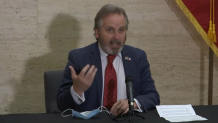Texas Gov. Greg Abbott (R) and State Sen. Bryan Hughes (R-Mineola) announced a bill before the 87th Texas Legislature that will "help prohibit social media companies from censoring Texans based on the viewpoints they express."
According to the Texas Legislature, Senate Bill 12 would give Texans a way to get back online if a social media company bans or blocks their account based on their political or religious views.
During a news conference Friday in Tyler, Abbott joined Hughes, who authored the bill, where they compared social media sites to a modern-day public square where people go to share ideas and have conversations.
Abbott said the bill aims to "prevent social media platforms from canceling conservative speech," a concern voiced by many conservatives after former President Donald Trump was removed from social media platforms after repeatedly making false claims about the outcome of the 2020 election.
Get top local stories in DFW delivered to you every morning. Sign up for NBC DFW's News Headlines newsletter.
"What they are doing, they are controlling the flow of information and sometimes denying the flow of information. They are in the position of choosing which viewpoints are going to be allowed," Abbott said, adding that the state wasn't going to allow big tech political censorship in the Lone Star State.
"Too many social media sites silence conservative speech and ideas and trample free speech. It's un-American, Un-Texan, and soon to be illegal," Abbott wrote in a tweet Thursday night.
Abbott and Hughes said the bill would allow Texans kicked off of a social media platform a legal path to get them back online.

"They are common carriers and they cannot discriminate against people ... it's a violation of the first amendment," Hughes said. "This is going to protect Texas' free speech and get them back online."
The question of social media censorship has been a key tension point between Republicans and Democrats nationwide, with social media executives facing questions by lawmakers on Capitol Hill about censorship and potential bias in their algorithms and content moderation decisions.

